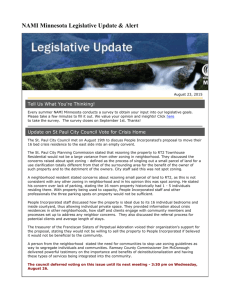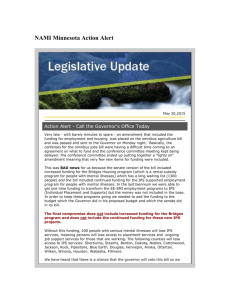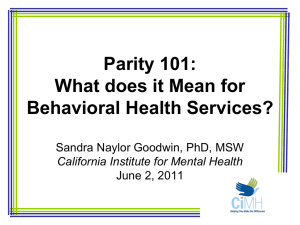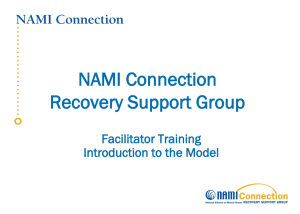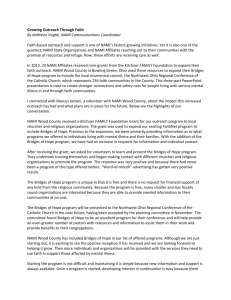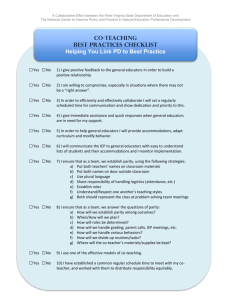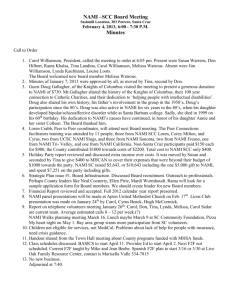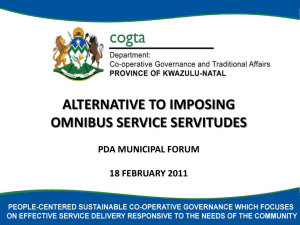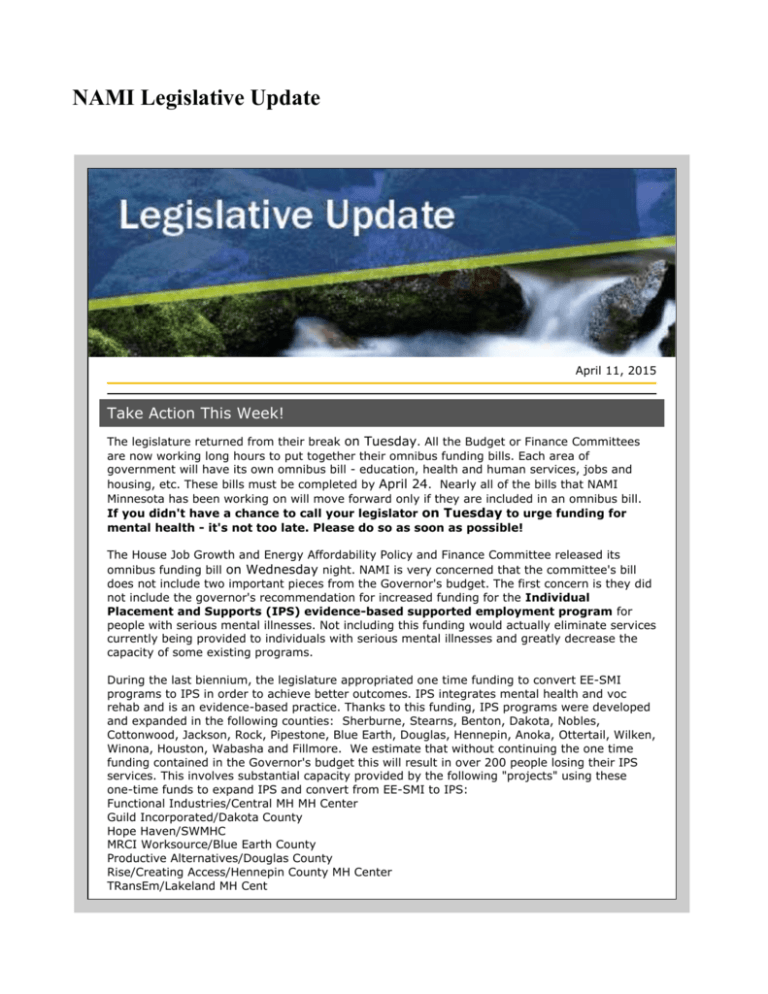
NAMI Legislative Update
April 11, 2015
Take Action This Week!
The legislature returned from their break on Tuesday. All the Budget or Finance Committees
are now working long hours to put together their omnibus funding bills. Each area of
government will have its own omnibus bill - education, health and human services, jobs and
housing, etc. These bills must be completed by April 24. Nearly all of the bills that NAMI
Minnesota has been working on will move forward only if they are included in an omnibus bill.
If you didn't have a chance to call your legislator on Tuesday to urge funding for
mental health - it's not too late. Please do so as soon as possible!
The House Job Growth and Energy Affordability Policy and Finance Committee released its
omnibus funding bill on Wednesday night. NAMI is very concerned that the committee's bill
does not include two important pieces from the Governor's budget. The first concern is they did
not include the governor's recommendation for increased funding for the Individual
Placement and Supports (IPS) evidence-based supported employment program for
people with serious mental illnesses. Not including this funding would actually eliminate services
currently being provided to individuals with serious mental illnesses and greatly decrease the
capacity of some existing programs.
During the last biennium, the legislature appropriated one time funding to convert EE-SMI
programs to IPS in order to achieve better outcomes. IPS integrates mental health and voc
rehab and is an evidence-based practice. Thanks to this funding, IPS programs were developed
and expanded in the following counties: Sherburne, Stearns, Benton, Dakota, Nobles,
Cottonwood, Jackson, Rock, Pipestone, Blue Earth, Douglas, Hennepin, Anoka, Ottertail, Wilken,
Winona, Houston, Wabasha and Fillmore. We estimate that without continuing the one time
funding contained in the Governor's budget this will result in over 200 people losing their IPS
services. This involves substantial capacity provided by the following "projects" using these
one-time funds to expand IPS and convert from EE-SMI to IPS:
Functional Industries/Central MH MH Center
Guild Incorporated/Dakota County
Hope Haven/SWMHC
MRCI Worksource/Blue Earth County
Productive Alternatives/Douglas County
Rise/Creating Access/Hennepin County MH Center
TRansEm/Lakeland MH Cent
Winona ORC/Hiawatha Valley MH Center
The committee bill also did not include the increased funding for Bridges Housing, which
provides a rental subsidy for people with serious mental illnesses. Bridges currently serves over
500 households per year and there are an estimated 1366 households on the waiting list for
Bridges. The 2013 Legislature increased funding for Bridges by $400,000 and there was over
$1.4 million in requests for those funds.
Our strategy now is to strongly advocate to the Senate Committee to include the
amounts in the Governor's budget. We need to have the increased funding in the Senate bill
so that we have a chance of keeping it when the bill goes to conference committee. If it's not
included we will lose programs and won't be able to expand affordable housing.
If your state senator is on the committee, please contact them Monday or Tuesday.
If they aren't on the committee, but this is an issue of concern to you, please contact
the chair of the committee, Senator Tomassoni.
Senator Tomassoni is actually the author of the NAMI IPS bill so is supportive, but nonetheless,
committee members need to know it's important to you. Here are some talking points remember to be nice!
Tell them who you are - a NAMI member, you live with a mental illness, have a family
member or work in the field
Urge them to increase funding for the IPS employment program for people with serious
mental illnesses and the Bridges Housing Program.
It is very difficult to recover from a mental illness without stable housing. People who
are homeless or who have unstable housing are far more likely to use expensive forms
of medical care and be re-hospitalized in less than 90 days.
Of all the people with mental illnesses using social services, 85% are unemployed. Not
only do our communities lose out on their gifts and talents, but these individuals lose
out on a program that can help them with their recovery. Employment provides
structure, interaction with others, a reason to get up in the morning and income.
Thank them in advance for their support.
For a list of members, click here. To contact Sen Tomassoni, click here.
Not sure who represents you?
Committee Hearings
Senate Health and Human Services Budget Division
On Wednesday morning, the committee heard SF 1246 (Clausen) which would add residency
slots including psychiatry and clinical training programs. The bill was laid over for possible
inclusion in the omnibus bill.
On Thursday morning the committee heard SF 1292 (Sheran) that would increase funding for
nonemergency medical transportation providers, implement the new modes of
transportation, increase rates for personal and volunteer mileage and finally fund protected
transport. Sue Abderholden, as the co-chair of the NEMT task force, testified in favor of the bill.
It was laid over for possible inclusion.
On Friday, the committee reviewed the Governor's supplemental budget provisions relating to
health and human services. In the amendment to the bill there were several items of interest
to NAMI. The adult mental health act would be amended by specifically listing the programs
funded under the grants including mental health crisis, housing with supports and PATH
(homeless) programs. They then list out all the "codes" counties use the funding for. A report to
the legislature would be required to provide information on how the grant money is being used
by the mental health initiatives.
Similar language is included for the grants for children's mental health. It included first episode
but includes language for a public awareness campaign which NAMI doesn't support. It also
includes language to delay the closure of the CABHS program in Willmar until June 30, 2016.
The committee heard SF 716 (Eaton) which has a number of important issues for NAMI. First, it
asks the Department of Human Services (DHS) and MNSCU to see if there are courses people
could take at community colleges to meet some of the requirements for becoming a peer
specialist and it requires increased outreach to providers to encourage them to hire peer
specialists. Second, it directs DHS to figure out how we can use Medical Assistance funding for
services provided by clubhouses. Third, it funds first episode programs for people
experiencing their first psychotic or manic episode. Finally, it funds supportive housing.
In an amendment that was adopted by the committee, it also now includes funding for start-up
costs for crisis residential beds. Half of the funds would be targeted to greater Minnesota and
to areas that don't have an inpatient psychiatric unit in their region or within 90 miles or have a
demonstrated need based on population.
Sue Abderholden helped explain the bill, including how important it is to create career ladders
for peer specialist. She explained that the DHS proposal for first episode programs does not
include young people experiencing their first manic episode and that they have funds to conduct
a public awareness campaign. NAMI wants the funding to go to the projects to conduct outreach
to mental health professionals, primary care, etc. to teach them about the signs and symptoms
and what to do.
Julia Tate testified to how Vail Place changed her life and encouraged the committee to support
the bill so that clubhouses have a more stable source of funding. Tina Nunemacher-Tews,
Director of Community Support Programs at Zumbro Valley Health, testified on Intensive
Community Rehabilitative Support Services and provided evidence for their effectiveness.
Andrea Lee, Director of Youth Programming, testified about the importance of first episode
programs and then shared her family's story. She ended her testimony by saying that "Families
need to know where to go when a young person is experiencing symptoms of psychosis. Delay
is not an option. We need specialists throughout Minnesota who can intervene with evidencebased practices as soon as possible so that every young person that experiences psychosis gets
the best treatment and the best possible recovery." The bill was laid over for possible inclusion
in the omnibus bill.
The committee also heard SF 981, which would expand telemedicine and S.F. 633 (Franzen)
which provide chemical dependency providers a rate increase under Medical Assistance.
Senate Judiciary Budget Division - Justice Programs Subdivision
The committee heard SF 851 (Carlson) which would fund de-escalation training for peace
officers, specifically targeted at veterans. The bill was laid over for possible inclusion into the
omnibus bill.
Also heard was SF 184 (Franzen) which funds Youth Intervention Programs. Intervention
programs work and can transform troubled youth to become assets to our society. Bill was laid
over for possible inclusion into the omnibus bill.
SF 210 (Goodwin) provides $250,000 each year for support services for family members of
suicide, accidental deaths, and homicide. Ramsey County Attorney John Choy testified that
we often forget about surviving victims. Other testifiers shared stories of how survivor services
have helped them. The bill was laid over for possible inclusion in the omnibus bill.
SF 1590 (Dibble) funds juvenile detention alternatives. Sen Dibble stated that our juvenile
justice system is expensive, discriminatory, ineffective, and arbitrary. The bill will provide
grants to help reform the juvenile justice system. Alternatives to detention include electronic
monitoring, release to the supervision of parents, appointments with community coaches, or
visits to evening reporting centers. It was laid over for possible inclusion into the omnibus bill.
House Health and Human Services Finance
On Tuesday night the committee heard HF 1350 (Norton) that would increase funding for
nonemergency medical transportation providers, implement the new modes of
transportation, increase rates for personal and volunteer mileage and finally fund protected
transport. Sue Abderholden, as the co-chair of the NEMT task force, testified in favor of the bill.
It was laid over for possible inclusion.
On Wednesday night the committee met to hear four bills of interest to NAMI Minnesota. HF
211 (Kriel) would expand the rural loan forgiveness program to mental health professionals
and HF 1447 (Kriel) would expand residency programs, including psychiatry, and would add
clinical training programs. Both bills would assist our efforts to increase the mental health
workforce in Minnesota. Sue Abderholden testified briefly in favor of the bill noting that the bills
reflected some of the recommendations from the workgroup and that the mental health
community would be back next year to move the additional recommendations forward.
Catherine Job from Sioux Trails Mental Health Center testified in favor of the bill.
The committee heard HF 1073 (Backer) which would eliminate the word "constant" from the
PCA or CFSS program. This wording will cause problems in the future and make it very difficult
for people with mental illnesses to qualify since they would need "constant supervision" which
they don't. Anne Henry from the Disability Law Center and Sue Abderholden from NAMI
Minnesota testified in favor of the bill.
The committee also heard HF 1063 (Backer) which has several important provisions. First, it
asks the Department of Human Services (DHS) and MNSCU to see if there are courses people
could take at community colleges to meet some of the requirements for becoming a peer
specialist and it requires increased outreach to providers to encourage them to hire peer
specialists. Second, it directs DHS to figure out how we can use Medical Assistance funding for
services provided by clubhouses. Third, it funds first episode programs for people
experiencing their first psychotic or manic episode. Finally, it funds supportive housing. No
testimony was taken on the bill. The bills were laid over for possible inclusion in the omnibus
bill.
On Thursday, the committee heard HF 1209 (Barrett) the suicide prevention bill. Sean
Haines testified again, sharing his family's story of losing their daughter to suicide. He
encouraged members to increase funds so that other families don't have to go through what his
did. Donna Fox, program director at NAMI Minnesota, testified as well, outlining the current
suicide prevention programs offered by NAMI Minnesota and explaining recent efforts to train
people in postvention training. Chair of the committee, Rep Dean, thanked them for their
testimony and thanked NAMI for their work. The bill was laid over for possible inclusion in the
omnibus bill.
This Week at the Capitol
On Monday the House Health and Human Services Finance Division will hear HF 1653 (Baker)
which would create Psychiatric Residential Treatment Facilities (PRTF); HF 1011 (Albright)
which allows physician assistants to provide med management under the direction of a
psychiatrist in outpatient settings (and a compromise may have been reached); HF 604 which
would increase MA rates to chemical dependency providers; HF 560 (Albright) which decreases
the premiums for people on MA-EPD.
On Tuesday, the committee will hear HF 1665 (Dean) which repeals MinnesotaCare. On
Wednesday they will hear HF 1246 (Mack) related to telemedicine; HF 658 (Zerwas) which
decreases what people have to spend down to for MA; HF 573 (Mack) which allows other
mental health professionals to provide consultative services; HD 976 (McDonald) which
provides presumptive eligibility for group residential housing when you're in crisis home; and
HF 339 (Hancock) which creates the pilot in Beltrami County for a central receiving center.
On Tuesday, the Senate HHS Budget Division will hear SF 702 (Sheran) which requires people
committed to the MN Security Hospital in St Peter to have a review every three years; SF 892
(Hayden) which provides presumptive eligibility for group residential housing when you're in
crisis home.
On Wednesday they will hear SH 1311 (Sheran) the suicide prevention bill and SF 934
(Franzen) which would limit how health plans use prior authorization for medications. On
Wednesday, the Senate Transportation Committee will hear the Nonemergency Medical
Transportation bill.
The House Omnibus Public Safety bill (HF 849) will be heard Tuesday in the Public Safety and
Crime Prevention Policy and Finance Committee. The delete all amendment contains the
language that would increase the penalties if someone committed to the MN Security Hospital
injures or throws bodily fluids on staff that work there.
Mental Health Parity
This article is from the National Council
Monday, the Centers for Medicare and Medicaid Services (CMS) released its long-awaited
proposed rule outlining how the 2008 Mental Health Parity and Addiction Equity Act applies to
state Medicaid programs. The rule will extend parity protections to an estimated 22.5 million
Americans covered by Medicaid and CHIP, according to CMS. It generally mirrors final
regulations promulgated by CMS in 2013 that detail how parity applies to group insurance
plans, with some key exceptions to account for differences in delivery system design between
Medicaid and private insurance.
The National Council praised the proposed regulation for preserving states' flexibility in delivery
system design while safeguarding beneficiaries' access to mental health and addiction care
regardless of how Medicaid services are delivered in their state.
"This proposed rule represents a key piece of the parity puzzle," said Linda Rosenberg,
President and CEO of the National Council. "Now, states and Medicaid managed care plans will
have the details they need to ensure that beneficiaries have access to the full protections
promised to them under the parity law. We applaud CMS for so thoroughly focusing on
prohibiting discrimination and addressing many of the treatment limitations that have
prevented enrollees from accessing the mental health and addictions care they need."
Proposal "Generally Mirrors" 2013 Final Rule
Much like the 2013 final rules for group insurance plans, the new proposal would preserve the
general parity rule that prohibits health plans from applying financial requirements or treatment
limitations to mental health and addictions benefits that are more restrictive than those
imposed on substantially all medical/surgical benefits of a similar kind.
CMS also carried over its definition of treatment limitations as both quantitative (such as annual
visit limits) and non-quantitative (such as medical necessity determinations or prior
authorization requirements). In both categories, plans must establish standards to ensure that
any benefit restrictions are applied in a similar manner to both mental health/substance use
and medical/surgical benefits.
Importantly, this does not mean that all behavioral health services will always be free from
certain limitations. For example, plans may design formulary restrictions that disproportionately
affect mental health drugs, as long as those restrictions are based on objective standards that
are applied equally to mental health and medical/surgical medications. Plans are also required
to use comparable methodologies to determine reimbursement rates; however, this does not
mean that specialty behavioral health providers will necessarily receive equivalent
reimbursement to their medical/surgical counterparts. Plans are considered to be in compliance
with parity as long as their processes for establishing treatment limitations are applied in a
similar manner to mental health/substance use as they are to medical/surgical benefits.
The proposed rule is notable for its thorough examination of non-quantitative treatment
limitations, with an extensive list of examples illustrating when these types of limitations
comply with or violate parity. The rule also includes a non-exhaustive list of such limitations,
which include formulary design, standards for empaneling providers in insurance networks, failfirst policies, and restrictions based on geographic location, provider specialty, and facility type.
Parity Applies in Both Carved-In and Carved-Out Arrangements
Also of note for behavioral health providers, the proposed rule clarifies that parity applies to
Medicaid managed care beneficiaries even in states where behavioral health services have been
carved out of managed care contracts. In such cases, states are responsible for ensuring that
the entire package of Medicaid services for managed care enrollees complies with the parity
law, regardless of whether the services are delivered in a managed care organization, fee-forservice Medicaid, or other delivery arrangement. While the proposed rule does not apply to
beneficiaries who receive their care entirely through traditional Medicaid fee-for-service, CMS
strongly encourages states to modify their state plans so that benefits are consistent across all
categories of beneficiaries.
Rule Offers No Additional Requirements for Scope of Services
While many advocates had hoped that the new proposed rule would go beyond the terms of the
2013 final regulation in establishing a scope of services that plans must provide to comply with
parity, CMS did not take this approach. Instead, it reiterated that - like group plans subject to
the 2013 rule - Medicaid plans do not have to offer coverage for specific conditions, nor do they
have to offer any particular array of mental health and substance use care. The rule does
identify four classifications of services - inpatient, outpatient, prescription drug, and emergency
care - and requires that if plans offer mental health and substance use in any of these
categories, they must offer it in all four.
The proposed rule acknowledges that not all mental health and substance use care settings fall
cleanly into the "inpatient" or "outpatient" categories. Like the 2013 final rule, the new proposal
does not denote a classification for intermediate levels of care such as intensive outpatient
treatment, residential treatment, or partial hospitalization. Rather, it requires plans to assign
these intermediate care levels to either the inpatient or outpatient classification in a manner
that is similar to how intermediate care levels are assigned on the medical/surgical side. This
approach ensures that intermediate care settings commonly used by individuals with mental
illness and addictions are fully subject to the protections of the parity law.
Plans Must Meet Disclosure Requirements
The proposed rule requires Medicaid managed care plans, alternative benefit plans, and CHIP
plans to make their criteria for medical necessity determinations available to enrollees or
contracting providers upon request. Plans must also make available to enrollees the reason for
any denial of services. Additionally, states must publicly post documentation of their compliance
with the parity requirements outlined in the rule.
States, Managed Care Entities Share Responsibility for Compliance
In states where all services are fully included within managed care contracts, managed care
organizations are responsible for ensuring their compliance with parity, even if doing so means
covering services beyond the scope of those outlined in the state Medicaid plan. Managed care
organizations may include the cost of these services in their calculations of actuarial soundness
when contracting with Medicaid, meaning that any additional cost of covering services needed
to comply with parity falls squarely on the state.
In states where some or all mental health and addictions services are carved out of managed
care arrangements, the state is responsible for ensuring that beneficiaries have access to
services that comply with parity, across the entire delivery system. States may decide to make
changes to their state plan to provide mental health and substance use services in the fee-forservice system in a manner that is on par with the medical/surgical services provided by the
managed care organization(s), or they may decide to include these services in the scope of
managed care contracts.
Effective Date is Dependent on Publication of Final Rule
The proposed rule would give states 18 months from the publication of the final rule to come
fully into compliance with these requirements.
Next Steps
CMS is accepting public comments on the rule through June 9, 2015.
Attend the NAMI Spring Gala and Support Our Work! Click Here.
Bill Summaries
House
HF 2140 (Dean, M.) Referred to the Committee on Health and Human Services Reform.
Requires the commissioner of human services to establish a web application that allows users to
compare prescription drug prices at various pharmacies.
HF 2172 (Johnson, C.) (Companion to SF 2038) Referred to the Committee on State
Government Finance. Appropriates $69 million from bond proceeds for the second phase of
renovation at Minnesota Security Hospital, St. Peter.
HF 2177 (Moran) (Companion to SF 2035) Referred to the Committee on Health and Human
Services Finance. Appropriates $321,000 for a grant to a Ramsey County organization serving
African American men who have experienced some degree of homelessness.
HF 2181 (Baker) (Companion to SF 1966) Referred to the Committee on Health and Human
Services Reform. Allows the commissioner to authorize additional days of psychiatric contract
bed use beyond 45 days. Removes the language that psychiatric contract beds are unavailable
for those who are eligible for Medicare and have not reached their lifetime Medicare psychiatric
benefit limit.
HF 2184 (Moran) (Companion to SF 1871) Referred to the Committee on Health and Human
Services Reform. Appropriates money for grants to promote health and resiliency in families,
children, and communities. The grants should focus on community-level policies, systems, and
environments in order to build the capacity of communities to identify and expand opportunities
to strengthen population health.
Senate
SF 2018 (Pederson, J.) (Companion to HF 1898) Referred to the Committee on Finance. This bill
appropriates $140,250 to fund a youth development and crime prevention program in central
Minnesota. The program aims at helping recent immigrants to integrate into school and
community life through the use of mentors, activities, and events.
SF 2035 (Cohen, Champion & Pappas) (Companion to HF 2177) Referred to the Committee on
Finance. Appropriates $321,000 for a grant to a Ramsey County organization serving African
American men who have experienced some degree of homelessness.
SF 2038 (Sheran & Jensen) (Companion to HF 2172) Referred to the Committee on Capital
Investment. Appropriates $69 million from bond proceeds for the second phase of renovation at
Minnesota Security Hospital, St. Peter.
NAMI Minnesota | 800 Transfer Road, Suite 31 | St. Paul, MN 55114
namihelps@namimn.org| http://www.namihelps.org
651-645-2948 | 1-888-NAMI-HELPS
Stay Connected
Copyright © 2014. All Rights Reserved.

